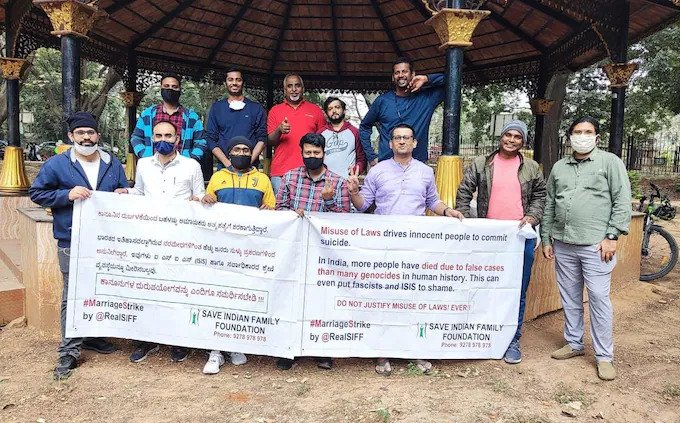
Section 375 of the Indian Penal Code (IPC) as it currently stands defines rape and the concept of consent but also says that these conditions do not apply in the case of married couples. In other words, non-consensual sexual intercourse by a man with his own wife, over 18 years of age, is not considered rape by law. 32 percent of women in India who have ever been married have experienced physical, sexual, or emotional violence by their husbands, according to the latest fifth round of the National Family Health Survey.
A special bench of the Delhi High Court has been actively hearing a batch of four petitions challenging this exemption since January this year. However, the issue has been lingering since 2015 when the first petition challenging the constitutional validity of the law was filed. Various men’s rights organizations also filed counter-petitions opposing the criminalization of marital rape on various grounds.
The Central government had refused to take a clear and independent stand on the issue. Early this year, it had informed the Delhi high court that it invited suggestions from chief ministers, judicial authorities, national law universities, and members of both Houses of Parliament. It further said that until the Centre’s consultation with all stakeholders is complete, marital rape could not be made into a criminal offence, and requested the court to defer the hearings. However, the Bench refused to accept the Centre’s request saying "there is no terminal date when the consultation process will get over" and proceeded to reserve judgment after hearing the parties.
The 2-member Bench, on Wednesday, in its final hearing delivered a hung verdict. While Justice Rajiv Shakdher, who headed the division bench, favoured striking down the marital rape exception, Justice C Hari Shankar said the exception is not unconstitutional. As a result, marital rape continues to remain a non-criminal offence in India.

Arguments by the Petitioners
The petitioners had challenged the constitutionality of the marital rape exception under section 375 of the IPC on the ground that it discriminated against married women who are sexually assaulted by their husbands. Advocate Karuna Nundy and Senior Advocate Colin Gonsalves presented the following key arguments on behalf of the petitioners.
- The object of rape laws is to ensure that women are not raped. Retaining the Exception under Section 375 will nullify the very object of rape laws.
- The exception under Section 375 is unconstitutional because it gives primacy to the institution of marriage over the individuals in the marriage.
- Marital rape violates a woman's right to dignity, personal and sexual autonomy and her right to self-expression enshrined under the Constitution of India.
- The possibility of misuse of law, false complaints, different punishment, and the impossibility of evidence, should not deter the courts from striking down an unconstitutional provision.

Arguments of those opposing the petitions
Advocate J Sai Deepak appeared for the NGO, Men Welfare Trust (MWT) while Advocate Raj Kapoor appeared for an NGO named Hridey arguing that the marital rape exception should not be struck down on the following grounds:
- Sexual intercourse between a husband and wife cannot be treated at par with that in non-marital relationships as the issue of consent cannot be divorced from the context of a marriage.
- The wife cannot compel parliament to prescribe a particular punishment against her husband just to satisfy her ego.
- Non-consensual sex between a husband and wife cannot be labeled as rape and, at worst, it can be called sexual abuse.
- Striking down Exception 2 has the potential to destroy the institution of marriage since a wedding is not only a union between two individuals but also affects the children as well as the entire family.
- The issue of marital rape should be kept outside the jurisdiction of courts
- Even if the Exception is assumed to be unconstitutional, the Court should cede space to the legislature in respect of the doctrine of separation of powers.
Arguments by Amicus Curiae
An amicus curiae “friend of the court” is an individual or organization who is not a party to a legal case, but who is permitted to assist a court by offering information, expertise, or insight that has a bearing on the issues in the case. The decision on whether to consider an amicus brief lies within the discretion of the court.
The Court had appointed Senior Advocate Rebecca John and Rajshekhar Rao as Amici Curiae in the matter. Both of them supported the petitioners and asked the court to strike down the provision on the following grounds:
- It is not reasonable, just, and fair in today’s age to deny the wife a right to call rape a rape.
- Status of marriage between two parties cannot be sufficient reason to deny a wife the ability to prosecute her husband for marital rape.
- Section 375 is predicated on the issue of consent, or the lack of consent, the indirect effect of the exception has been to obliterate the consent altogether.
- The expectation of sex in marriage cannot result in forceful sexual relations
- If marital rape is criminalised, charges of attempt to rape will also be attracted against a husband.
- Many statutes punish a variety of crimes committed against wives but each of these provisions and statutes deals with specific crimes and the crime of rape is outside their purview.
Views of the Bench
Justice Rajiv Shakdher
- Deifying women has no meaning if they are not empowered. They are our equal half; some would delightfully say our better half
- It would be tragic if a married woman's call for justice is not heard even after 162 years, since the enactment of IPC
- To my mind, self-assured and good men have nothing to fear if this change is sustained. If I were to hazard a guess, those amongst us who want the status quo to continue would perhaps want to have the MRE struck down if the victim involved was his/her mother, sister, or daughter.
Justice Hari Shankar
- The Exception does not say that husbands would be exempted, or excepted, from being prosecuted for rape; it says, rather, that, sexual acts between a husband and wife are not rape. The offence of rape, therefore, does not exist, when the man and woman are married.
- It is impossible for this Court to grant the reliefs sought by the petitioners, as it would result in the creation of an offence, which is completely proscribed in law.
What happens now?
The issue of criminalization of marital rape witnessed a split verdict from a division bench of the high court with one of the judges favoring a strike down of the exception in law which grants protection to husbands from being prosecuted for non-consensual sexual intercourse with their wives, while the other judge refused to classify it as unconstitutional.
However, both the judges concurred in granting a certificate of leave to appeal to the Supreme Court as it involves substantial questions of law that require intervention by the top court in the country.
How does India compare with the world on marital rape?
India is among the 34 countries in the world where marital rape is not considered a criminal offence. According to a UN Women report, most of these 34 countries were developing nations including Pakistan, Bangladesh, Myanmar, Sri Lanka, Mali, Haiti, Laos, Senegal, Tajikistan, and Botswana.
TO READ THE FULL ARTICLE

Get full access to the exciting content on The Mirrority by logging in
Support independent journalism
Even the very best of media houses in our country today are yielding to the pressure of click-bait journalism in order to survive. More than ever before, our country needs journalism that is independent, fair and non-pliant to the bureaucracy. Such journalism needs the support of like-minded readers like you to help us survive editorially and financially.
Whether you live in India or India lives inside you, help us continue to produce quality journalism with your contribution.
CONTRIBUTE
